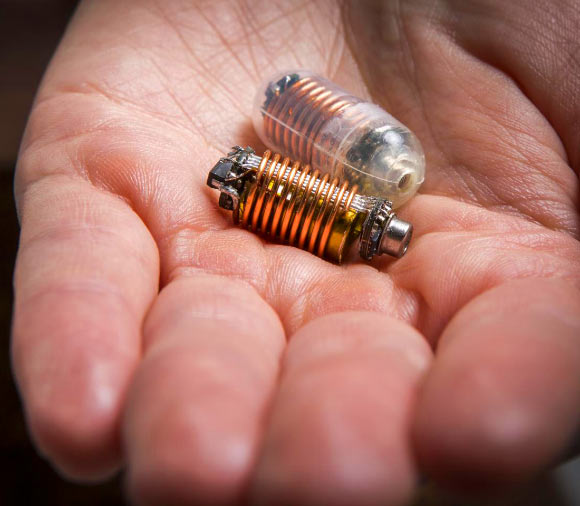A swallowable gas-sensing capsule (about the size of a vitamin pill) developed by RMIT University, in collaboration with Monash University and Atmo Bioscience, provides real time detection and measurement of hydrogen, carbon dioxide and oxygen in the gut, and is 3,000 times more accurate than current technology used to diagnose many gut disorders.

This gas-sensing capsule is 3,000 times more accurate than current technology used to diagnose many gut disorders. Image credit: RMIT University.
Intestinal gases are currently used to diagnose disorders including small intestinal bacterial overgrowth and carbohydrate malabsorption.
Of the one-in-five people worldwide who will suffer from a gastrointestinal disorder in their lifetime, almost a third remain undiagnosed due to a lack of reliable tests available to gastroenterologists.
“The results showed high sensitivity and signal-to-noise ratio in measuring the concentration of intestinal hydrogen, providing valuable information at the site of intestinal gas production,” said study lead author and capsule co-inventor Professor Kourosh Kalantar-Zadeh, of RMIT University.
“This gives us confidence that our new technology could potentially solve many mysteries of the gut and help the large portion of the population who have not been able to find a useful diagnosis or treatment for their symptoms.”
The findings from the first human trials revealed the stomach releases oxidizing chemicals to break down and beat foreign compounds that are staying in the stomach for longer than usual. Such an immune mechanism has never been reported before.
The team’s new paper, published in the journal Alimentary Pharmacology and Therapeutics, made a direct comparison between measuring hydrogen production within the gut via the gas-sensing capsule and indirect measurement through breath testing.
Trials were conducted on nine healthy individuals in a blinded comparative study on absorbable versus fermentable carbohydrates.
“The second human trials have revealed information about gas production in the gut previously masked when measured indirectly through the breath,” said capsule co-inventor Dr. Kyle Berean, from RMIT University and Atmo Bioscience.
“The rate of false positive and false negative diagnosis that breath tests give is a real problem in gastroenterology.”
“Being able to measure these biomarkers at concentrations over 3,000 times greater than breath tests is quite astonishing.”
“Importantly this test is non-invasive and allows the patient to continue with their daily life as normal.”
_____
Kyle J. Berean et al. The safety and sensitivity of a telemetric capsule to monitor gastrointestinal hydrogen production in vivo in healthy subjects: a pilot trial comparison to concurrent breath analysis. Alimentary Pharmacology and Therapeutics, published online August 1, 2018; doi: 10.1111/apt.14923







